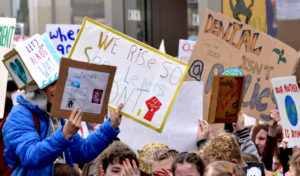On Friday 15 March thousands of school children and young people in over 100 countries around the world went on strike, taking to the streets to send a strong message that inaction on climate change will not be tolerated. Governments have promised action, but average global temperatures are set to rise by 3.2C. This is more than double Paris Agreement threshold of 1.5C.

Joining students in support of their march in Brighton, it was inspiring to see their commitment, energy and belief in the possibility of change. That change, as evidence highlights, will require this type of citizen action to be combined with rapid action from governments, fossil fuel companies and businesses worldwide.
Youth Strike 4 Climate
The roots of the Youth Strike 4 Climate phenomenon began back in August 2018 with 16-year-old Greta Thunberg from Sweden. Concerned about the heatwaves and wildfires in Sweden, Greta decided to skip school every day until the 2018 Swedish election, to sit outside parliament and demand that politicians bring the country in line with the Paris climate agreement. After the election, she continued to strike most Fridays, gaining worldwide attention and sparking a vast and growing movement.
Google Map of 15 March Youth Strike 4 Climate locations worldwide
Young people involved in the protests worldwide have been clear in their criticisms and demands of governments. George Bond, 16, of the UK Student Climate Network said:
“It really is time that the government, irrespective of whoever is in power stands up, put up their hands and admit that they severely failed to address the climate crisis so far. The scientists have been telling governments, policy-makers and big business that we need to realign all sectors of the economy along environmental principles, yet they’ve been dragging their heels and now we’re left to pick up the pieces.”
And while some politicians such as Brighton and Hove MP, Caroline Lucas, have been supportive, others have been more critical.


Moving beyond crisis
In a recent Sussex Development Lecture, Peter Newell, from University of Sussex, highlighted some positive moves, giving the example of Costa Rica, where the President Carlos Alvarado (IDS alum), has made plans to phase out fossil fuels, adding that France, Belize and New Zealand have introduced similar policies.
But globally efforts are nowhere near the level of ambition that is required. Structural transformation is needed, and supply-side climate policy needs to be addressed. Peter argues that we need a different approach that not only looks at the emission of greenhouse gasses and the use of new carbon technologies to reduce these, but we also need to direct greater efforts to manage resources more effectively in the first place. These are also arguments made by climate movements like Extinction Rebellion and Climate Justice Movement.
Watch short clip of lecture
Watch full lecture here.
Reducing carbon emissions means dealing with our collective fossil fuel dependency. One example of this dependency and currently a hot topic in the news is plastics pollution. As highlighted in this blog on the global politics of ocean plastic pollution by IDS researcher Patrick Schröder, over 99% of plastics are produced from chemicals sourced from fossil fuels. Subsidies incentivise the plastic market, resulting in plastics production continuing to be cheaper than the production of any alternative. So whilst efforts to ban single use plastics are welcome, unless we tackle the behaviours and actions of the trillion-dollar fossil fuel industry, their impact will remain limited.
The circular economy, a regenerative approach aimed at minimising waste and making the most of resources, provides some solutions. Examples like, community based approaches to waste management in Pakistan, have shown major benefits to society, reducing carbon emissions, improving public health and improving livelihoods.
Call to action
In a passionate TEDxStockholm speech, Greta Thunberg said, “There are no grey areas when it comes to survival. Either we go on as a civilization or we don’t. We have to change.” For this change to be truly sustainable, we need urgent commitment and a willingness to make critical changes from governments and powerful actors worldwide.
Related links
- Professional Development Course: Applying Circular Economy Approaches for a Sustainable Future
- Study: MSc Climate Change, Development and Policy
- ESRC STEPS (Social, Technological and Environmental Pathways to Sustainability) Centre